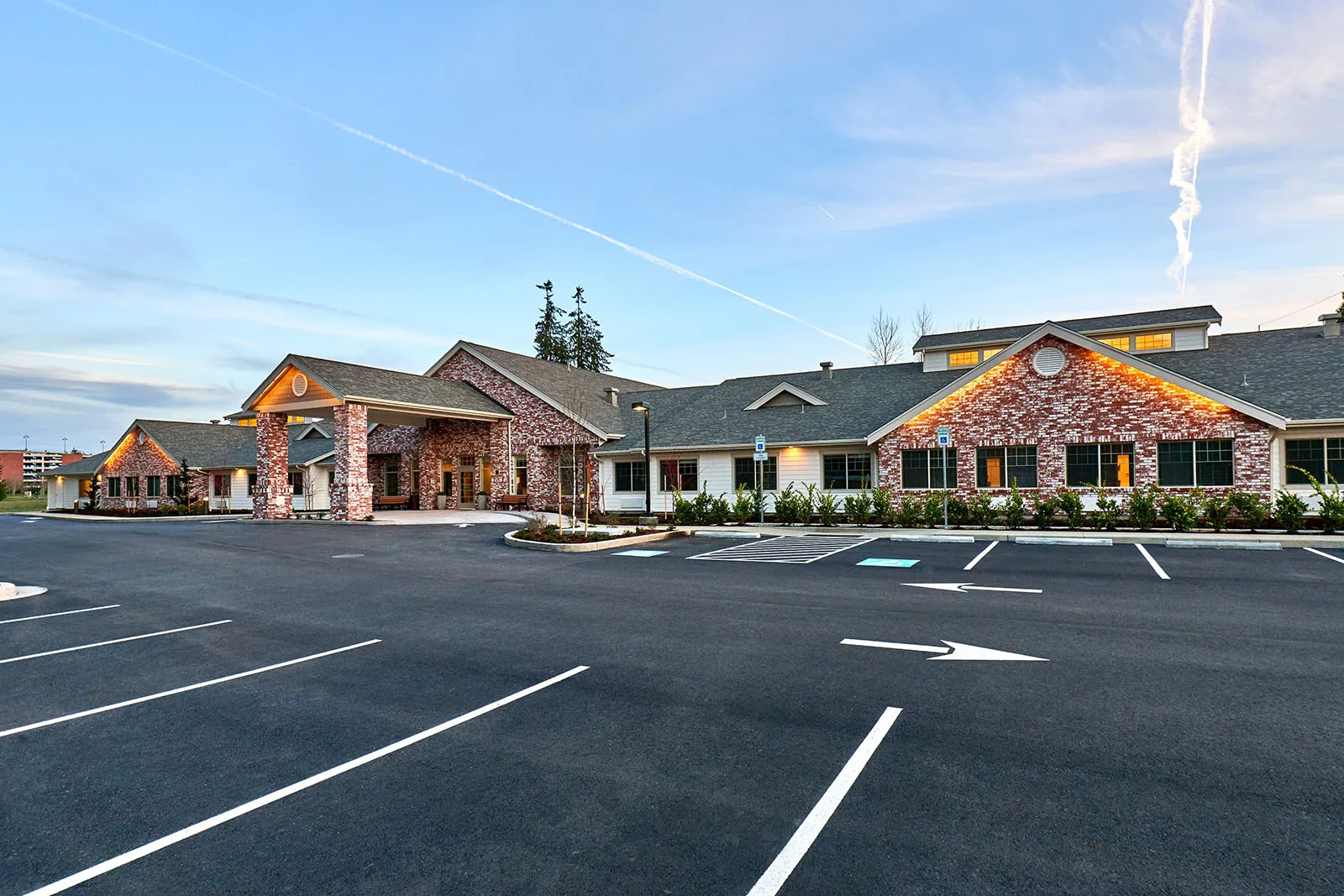How Long Is the Average Stay in a Memory Care Facility?

Understanding Memory Care Timelines
When a loved one transitions into memory care, families often ask: “How long will they stay here?” It’s a deeply emotional question, rooted in concerns about health, quality of life, and planning for the future.
The truth is, the length of stay in memory care varies greatly depending on individual health, stage of dementia, and support needs. While there is no single answer, national data offers guidance to help families understand what to expect.
The Average Length of Stay in Memory Care
According to research and senior care studies, the average stay in a memory care facility ranges from two to three years. Some residents may live in memory care for less than a year, while others remain for five years or more. The timeline for memory care is difficult because of the many factors that play an ongoing role. Some patients may only require care for a few months because of the rapid progression of dementia, while others may require years of care. Factors that influence this timeline include:
- Stage of dementia at move-in – Earlier transitions often result in longer stays.
- Other health conditions – Chronic illnesses, mobility challenges, or frailty can shorten or extend stays.
- Quality of care and environment – Communities that provide specialized dementia care often support longer, higher-quality life.
- Timing of the move – Families who delay transitioning until a crisis may find the stay is shorter.
The Alzheimer’s Association notes that individuals with Alzheimer’s live on average 4–8 years after diagnosis, but many live up to 20 years depending on health and support.
Why Families Choose Memory Care Earlier
Families sometimes hesitate to move a loved one into memory care, but earlier placement can actually:
- Improve safety and reduce hospitalizations.
- Provide structured routines and social engagement.
- Relieve caregiver burnout at home.
- Extend quality of life by surrounding residents with trained staff and enriching activities.
Stages of Dementia and Length of Stay
- Early Stage: Many people live independently or with family support. If they move into memory care during this stage, their stay may last several years.
- Middle Stage: This is when most families seek memory care support. Average stays often fall in the 2–3 year range.
- Late Stage: Residents may require skilled nursing or hospice care. Stays are often shorter, sometimes under a year.
Quality of Life Matters More Than Length
While families often focus on the timeline, what truly matters is the quality of each day. The best memory care communities provide:
- Personalized dementia care programs (like ONELIFE’s Luminate Memory Care).
- Engaging activities that nurture joy and purpose.
- Safe, secure environments designed for comfort and dignity.
- Family involvement through visits, communication, and support groups.
How Long Does End-Stage Dementia Last?
End-stage dementia can last anywhere from several weeks to two years. The length depends on overall health, mobility, nutrition, and other chronic conditions. During this phase, residents typically require full assistance with daily activities, and many families choose to add hospice or palliative care to ensure comfort and dignity.
What Are the Last Stages of Dementia Before Death?
The last stages are often marked by:
- Severe memory loss and limited awareness of surroundings.
- Difficulty communicating needs.
- Increased physical frailty, including swallowing difficulties and weight loss.
- Full dependence on caregivers for daily living.
While painful for families, compassionate memory care communities and hospice partnerships can provide comfort, routine, and support during this time.
What Are the Seven Stages of Dementia?
Healthcare providers often use the seven stages of dementia model to describe progression, from mild memory lapses to severe cognitive and physical decline. Each stage looks different, and families may notice symptoms like forgetfulness, disorientation, changes in behavior, and eventually full dependency.
For a deeper breakdown, see our detailed guide: Understanding the Stages of Dementia.
How Long Can a Person with Dementia Live at Home?
Some people live at home with dementia for years, especially with strong family support and in-home caregiving. However, risks like wandering, falls, isolation, and caregiver burnout often make memory care a safer, more sustainable option. Transitioning earlier allows families to maintain a loving role while trained professionals provide 24/7 support.
FAQ: Average Stay in Memory Care
How long is the average stay in a memory care facility?
The average stay is 2–3 years, though some residents stay less than a year and others live for 5+ years.
Do people with dementia live longer in memory care?
Yes. With specialized care, structured routines, and medical oversight, many residents experience improved safety and well-being, which can extend life expectancy.
How Long Does End-Stage Dementia Last?
End-stage dementia typically lasts from several weeks to two years, depending on overall health, mobility, and coexisting medical conditions. During this phase, residents often need full assistance with daily activities and may benefit from hospice or palliative care.
What Are the Last Stages of Dementia Before Death?
The last stages are marked by profound memory loss, limited communication, increased physical frailty, and reliance on others for all care needs. Families often partner with memory care communities and hospice providers to ensure comfort and dignity.
What Are the Seven Stages of Dementia?
Dementia progression is often described in seven stages, from mild memory lapses to severe cognitive and physical decline. You can read more in our detailed guide: Understanding the Stages of Dementia.
How Long Can a Person with Dementia Live at Home?
The ability to remain at home depends on safety, available caregiving, and support systems. Some individuals may live at home for years, but risks such as wandering, falls, and caregiver burnout often prompt families to consider memory care for stability and safety.
When is the right time to move a loved one into memory care?
Signs include wandering, aggression, caregiver burnout, and safety risks at home. Earlier transitions often result in longer, more stable stays.
Can someone with advanced dementia stay in memory care?
Yes, though some may eventually require hospice or skilled nursing if their medical needs exceed memory care support.
Does memory care include end-of-life care?
Some communities offer hospice partnerships, but not all do. Families should ask about end-of-life support when choosing a community.
Final Thoughts
The average stay in memory care is about two to three years, but every journey is unique. Rather than focusing on the number of years, families can find peace knowing their loved one is supported, safe, and surrounded by compassionate care.
👉 Wondering if now is the right time for memory care? Contact ONELIFE Senior Living today or schedule a tour to learn how our communities can support your family.
Explore ONELIFE Communities Near You
ONELIFE Senior Living is proud to serve families in multiple regions, offering exceptional care and support tailored to each resident’s needs. In Springfield, Oregon, The Esther at Riverbend Assisted Living provides personalized assisted living services, while The Rawlin at Riverbend Memory Care specializes in compassionate Alzheimer’s and dementia care. Families in Salem can find trusted support at Battle Creek Memory Care, and those in Beaverton benefit from the warm, secure environment at Waterhouse Ridge Memory Care.
For families in Nevada, Vineyard Henderson Memory Care offers expert dementia care in the heart of Henderson, while in California, The Reserve at Fountaingrove Memory Care provides high-quality memory support in Santa Rosa, and The Woodlake Senior Living serves Sacramento with a full spectrum of senior living options. In Cottage Grove, Oregon, Middlefield Oaks Senior Living combines independence and care, while in the Midwest, The Laurel at Vernon Hills Memory Care stands as a dedicated resource for families in Vernon Hills, Illinois. Finally, in Phoenix, Arizona, Shadow Mountain Memory Care delivers compassionate, all-inclusive memory care in a safe and engaging setting.
No matter which location you choose, every ONELIFE community is united by the same mission: providing exceptional care, meaningful activities, and a true sense of family for residents and loved ones.
Contact us
learn more about our
community

More Articles & Resources
EXPLORE THE ONELIFE COMMUNITIES




















